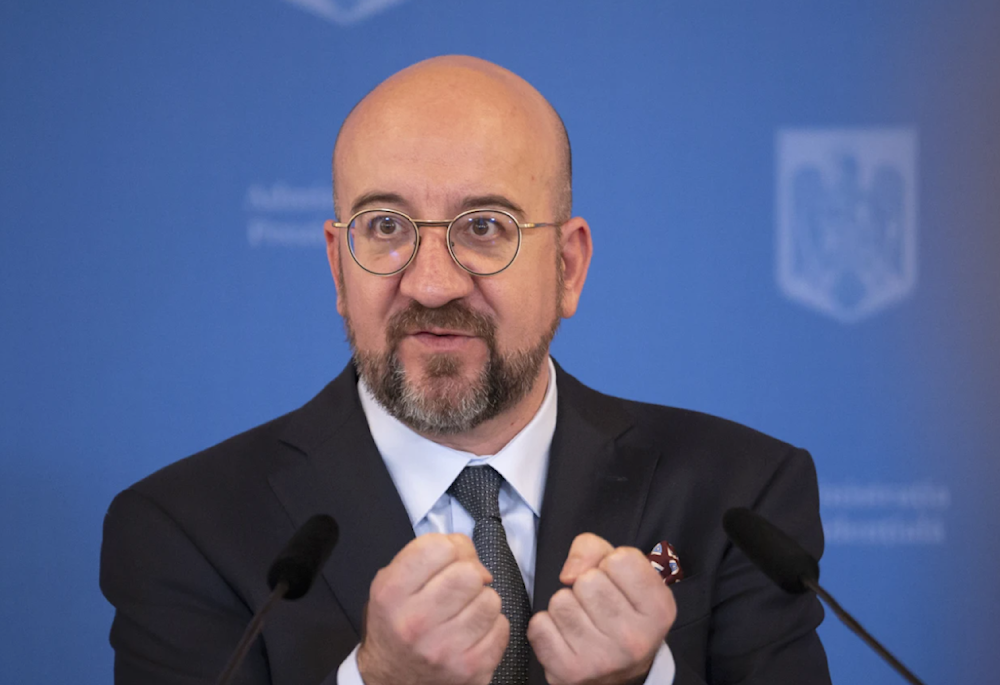EU 'too fragmented' to ensure industrial base for defense
Charles Michel expressed that there is consensus among EU leadership that there needs to be more invested in defense and security, and that the European industrial base also needed improvement.
-

European Council President Charles Michel gestures during a press conference with Romanian President Klaus Iohannis in BUcharest, Romania on April 3, 2024. (AP)
According to European Council President Charles Michel on Tuesday, the European Union is now "too fragmented" to establish an industrial base capable of supporting its military and security goals.
During the Copenhagen Democracy Summit Michel expressed that there is consensus among EU leadership that there needs to be more invested in defense and security, however, "there is another aspect that we will need to improve: the European industrial base."
He referred to the military and security sector as one of the three "fundamental priorities" of the European Union, alongside democratic ideals and economic progress, but acknowledged that there are still issues to be solved.
"If you want to be credible in the field of defense we need an industrial base, and today we are too fragmented in that field," he remarked.
On May 8, in response to a joint letter delivered in March by 14 European nations, the European Investment Bank amended its defense funding policy to make it more flexible and expand beyond dual-use projects.
Macron says Europe facing existential threat, is 'mortal', 'can die'
In late April, French President Emmanuel Macron cautioned that Europe is facing an existential threat and urged the EU to develop a "credible" security plan that was less reliant on the United States.
According to Macron, Russia's actions have been "uninhibited" as it was no longer obvious where the country''s "limits" were.
He also cautioned about what he saw as the US and China's disregard for global trade standards, urging the European Union to change its trade policies.
"It cannot work if we are the only ones in the world to respect the rules of trade - as they were written up 15 years ago - if the Chinese and the Americans no longer respect them by subsidizing critical sectors," he said.
"Our Europe, today, is mortal and it can die," he told the crowd. "It can die, and this depends only on our choices. He emphasized that the continent was not equipped to face the risks in a world where the "rules of the game have changed".
"Over the next decade... the risk is immense of (Europe) being weakened or even relegated," Macron warned, further mentioning the possibility of Iran allegedly gaining a nuclear weapon.
He claimed Europe was being "encircled" by other regional powers, while the continent was "too slow and not ambitious enough."
Macron called for a "powerful Europe" that "is respected," "ensures its security," and reclaims "its strategic autonomy."
He encouraged Europe to take more control of its future, claiming that it had previously relied too heavily on Moscow for energy and Washington for security. He stated that the "sine qua non" for European security was "that Russia does not win the war of aggression in Ukraine." He stated that he would seek bids from European allies in the coming months and that Europe also required its own cyberdefense and cybersecurity capabilities.
The French President stated that European companies should be given precedence when purchasing military equipment and supported the concept of a European loan to fund this endeavor.
Referring to the European elections on June 9, he declared that the response was not "timidity, but boldness." He railed against far-right nationalists in Europe who, he claimed, wished to stay in the "European house" but "without paying the rent" or following the "cohabitation rules".

 4 Min Read
4 Min Read








